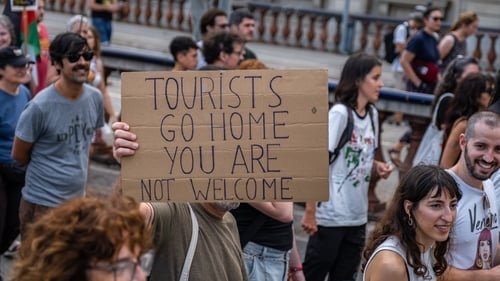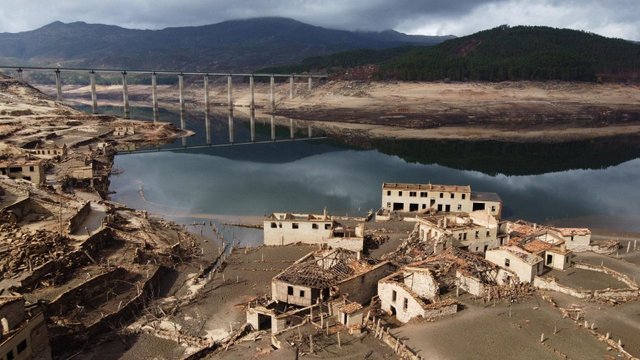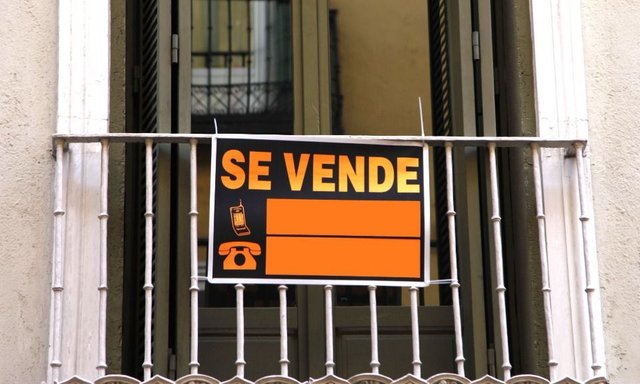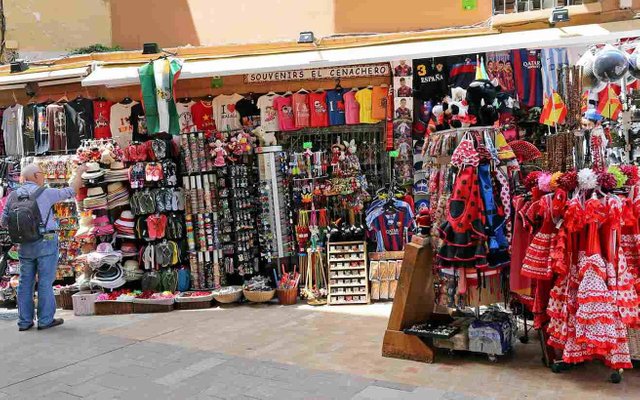Spain’s Tourism Protests – A Symptom of a Much Deeper, Hidden Issue

Many of you have likely seen a picture or video of Spanish locals harassing tourists in restaurants or on the streets with water pistols. In 2025, the anti-tourism movement has grown in Spain, with locals expressing their anger through this unusual form of activism—although, in the heat, it’s not an entirely unwelcome gesture if you’re struggling with 40°C+ temperatures.
Many Spaniards cite Airbnb or Booking.com as major causes of rising house prices and shortages. Indeed, tourism is at the heart of the issue for many Spanish residents because it is a major driver of the housing crisis and other social challenges. The protests are a response to the lack of effective regulation and the overwhelming impact of mass tourism on everyday life.
That said, Spain is heavily reliant on tourism as a core pillar of its economy. In 2024, the tourism sector contributed approximately €249 billion to Spain’s GDP, representing 15.6% of the national economy. This figure is expected to rise further, with forecasts for 2025 projecting a record €260.5 billion, or nearly 16% of GDP.
Tourism also plays a major role in employment, supporting about 3 million jobs in 2024 (nearly 14% of total employment), with projections of 3.2 million jobs (14.4% of employment) in 2025. Many bars and restaurants only open for the tourist season, as it is simply not profitable to remain open off-season.
A Scary Untold Truth of Spain – It’s Not the Tourists
Spain’s housing crisis is driven by a combination of insufficient housing supply, rising demand, and structural and regulatory challenges. While Spain’s population is increasing by over 400,000 people annually, fewer than 100,000 new homes are being built each year, creating a persistent shortage. Due to this shortage, the average rent has doubled in the last 10 years, while wages have increased by less than 20% in the same period. The construction of new homes has not kept pace with population growth, especially in major cities like Madrid, Barcelona, and Valencia, which has had the knock-on effect of forcing locals to leave while more and more foreign buyers move in. Those who keep their homes often end up turning to platforms like Airbnb or Booking.com to supplement a diminishing income or come to rely on it entirely.
But the painful irony is this: there are more than three million empty homes in Spain, many in rural or low-demand areas, while urban centers face acute shortages. Industries and jobs leave rural areas for the bigger cities, further exacerbating the need for housing in places like Madrid, Barcelona, and Valencia. Villages end up becoming abandoned and dilapidated, as there is nothing to keep people in them. These, too, end up on the market, with foreign investors paying anywhere from around €50,000 to €425,000 for a whole village, depending on size, location, and condition, with the agreement to rejuvenate them. For example, Bárcena de Bureba, a large abandoned village in Burgos, sold for €339,000 and included 62 buildings, a church, and several farms—it will be turned into a tourist hotspot.
Why Is This Happening?
Simply put, the Spanish government has utterly failed to properly regulate and stimulate the housing market, while maintaining one of the slowest and most bureaucratic construction processes in Europe.
For decades, Spain has invested very little in public or social housing. Currently, public housing makes up only about 2–3.4% of the total housing stock, far below the European average of over 9%, and much lower than countries like Austria, where public housing is a key tool for affordability. This lack of affordable alternatives has forced most people into the private market, increasing pressure on prices.
Part of the reason for avoiding investment in social housing is the high cost of building materials and a shortage of construction workers, which have made new housing developments less profitable, further limiting supply.
But even those who try to develop new housing face serious bureaucratic delays, complex permitting processes, and regulatory uncertainty that slow down development. Even when land is available, the proportion that is ready for immediate development (“finalist land”) is limited—the government moves at a snail’s pace, which is a somewhat systemic issue in Spain.
To understand this, you have to look back a little. Since the Franco era, Spanish housing policy has prioritized homeownership over renting or public provision. This model, continued by successive governments, fueled real estate speculation and made the market vulnerable to bubbles and crashes. After the 2008 crisis, rather than reforming the system, the government introduced tax breaks for real estate investment trusts, attracting large investment funds and increasing the concentration of property ownership. Many of these investors simply never finished these projects, leaving many unfinished buildings and houses to fall into ruin. Currently, about 26% of Spain’s planned residential stock remains pending construction—these are homes that have been approved or planned but not yet built. In major cities like Madrid and Barcelona, roughly 60% of planned homes are still unbuilt, largely due to lengthy urban development processes, legal complexities, and changing legislation that has created uncertainty for developers.
But who can afford to buy a house even in good economic environments? Tighter mortgage lending criteria, especially for young people and those with irregular incomes, have made it harder for many to buy homes, increasing reliance on the rental market, which is being squeezed by tourism.
I could go on to explain more aspects of the Spanish government’s failure to fix this problem, but that is not actually the issue I wanted to bring to your attention… it gets much worse.
The Rise of Xenophobia
Circling back to the tourism protests, if there is one thing we can deduce from this new form of activism, it is that more and more Spanish locals are utterly tired of this situation, which leads them to not be afraid to target someone for being from another country. I must emphasize that there are not nearly as many incidents of this as mainstream media make out, but it is growing. This is further compounded by a clear rise of the right-wing and far-right in Spain. Recent polls show that right-wing parties, particularly the Partido Popular (PP), Vox, and the new far-right party SALF, are gaining ground against the ruling Socialist Party (PSOE) and its left-wing allies.
Many of these parties will lean on the notion that it is the tourists to blame for the fact that a young couple cannot afford a house in their own country, while contradicting this by further encouraging the tourism industry to grow. Essentially, governments are avoiding having to answer for their complete and utter failure to grow the housing market, while allowing their voters to believe it is an issue caused by the very industry Spain relies on. It leads to people becoming more radical in their thinking towards foreigners and less critical of a government that is the very reason their wages stagnate, they cannot get a mortgage, and their grandparents have to leave the village their family is from because there are no jobs to keep people in the area to justify regional funding to maintain these charming villages.
The people of Spain have a right to be angry. But I fear they’re being subverted into channeling that anger into the wrong places… it is easy to get votes for your political party when you blame foreigners and give people unity by creating a group to hate—a group to blame for all your problems rather than taking accountability for your own inactions. This is an incredibly dangerous road, and it is not the one that will solve the country’s problems. It is no secret the rise of the right is a major concern across Europe, but there is an increase in negative perceptions and discrimination against migrants and minorities in some areas. The government does recognize the need for ongoing efforts to promote inclusion and counteract xenophobia, but with more right-wing influence on the rise, attitudes and perceptions are slowly starting to shift.
My View on the Matter
I don’t want you to read this and think Spain is becoming some bastion of fascism or right-wingers—it is not. The incidents of racism, discrimination, or targeting of migrants in general are still very low. But as a foreigner in Spain, I can indeed see a small shift in some people and their feelings towards the situation the country is in. There is a rise of the right. There is a rise in tourists being targeted and blamed for the issues created by the government. There is a rise in government incompetence, which is called out less and less.
My worry is that there are a growing number of Spaniards who are led to believe that foreigners are the problem, particularly among the younger generations, while ignoring the failure of the government to create a much better environment for Spaniards to buy their own homes. When you see so many shopfronts devoted to selling trinkets and fridge magnets to tourists instead of targeting the locals with products they would want to buy, you can understand why local frustration is growing. For decades, government policy favored the economic benefits of tourism, often at the expense of local residents’ housing needs. This “tourism-first” approach led to a fragile balance, which has been challenged by the serious housing crisis that can no longer be ignored. The question is, will the cause of this housing crisis be more openly and honestly explored by the government, or will it be brushed back under the carpet?
For a more in-depth look into what caused the housing crisis, check this video out:




